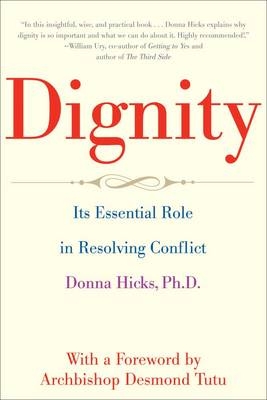
Dignity
Its Essential Role in Resolving Conflict
Seiten
2013
Yale University Press (Verlag)
978-0-300-18805-9 (ISBN)
Yale University Press (Verlag)
978-0-300-18805-9 (ISBN)
- Titel ist leider vergriffen;
keine Neuauflage - Artikel merken
The desire for dignity is universal and powerful. The author explains what the elements of dignity are, how to recognize dignity violations, how to respond when we are not treated with dignity, how dignity can restore a broken relationship, why leaders must understand the concept of dignity, and more.
The first comprehensive exploration of dignity, its role in human conflict, and its power to improve relationships of all kinds
"This book is a must read for those who want to experience peace in their everyday lives and peace in the world around them. Without an understanding of dignity, there is no hope for such change. If you want to find the weak links in a democracy, look for where people are suffering. You will most likely see a variety of violations. If you want peace, be sure everyone's dignity is intact."—Archbishop Desmond Tutu
The desire for dignity is universal and powerful. It is a motivating force behind all human interaction—in families, in communities, in the business world, and in relationships at the international level. When dignity is violated, the response is likely to involve aggression, even violence, hatred, and vengeance. On the other hand, when people treat one another with dignity, they become more connected and are able to create more meaningful relationships. Surprisingly, most people have little understanding of dignity, observes Donna Hicks in this important book. She examines the reasons for this gap and offers a new set of strategies for becoming aware of dignity's vital role in our lives and learning to put dignity into practice in everyday life.
Drawing on her extensive experience in international conflict resolution and on insights from evolutionary biology, psychology, and neuroscience, the author explains what the elements of dignity are, how to recognize dignity violations, how to respond when we are not treated with dignity, how dignity can restore a broken relationship, why leaders must understand the concept of dignity, and more. Hicks shows that by choosing dignity as a way of life, we open the way to greater peace within ourselves and to a safer and more humane world for all.
The first comprehensive exploration of dignity, its role in human conflict, and its power to improve relationships of all kinds
"This book is a must read for those who want to experience peace in their everyday lives and peace in the world around them. Without an understanding of dignity, there is no hope for such change. If you want to find the weak links in a democracy, look for where people are suffering. You will most likely see a variety of violations. If you want peace, be sure everyone's dignity is intact."—Archbishop Desmond Tutu
The desire for dignity is universal and powerful. It is a motivating force behind all human interaction—in families, in communities, in the business world, and in relationships at the international level. When dignity is violated, the response is likely to involve aggression, even violence, hatred, and vengeance. On the other hand, when people treat one another with dignity, they become more connected and are able to create more meaningful relationships. Surprisingly, most people have little understanding of dignity, observes Donna Hicks in this important book. She examines the reasons for this gap and offers a new set of strategies for becoming aware of dignity's vital role in our lives and learning to put dignity into practice in everyday life.
Drawing on her extensive experience in international conflict resolution and on insights from evolutionary biology, psychology, and neuroscience, the author explains what the elements of dignity are, how to recognize dignity violations, how to respond when we are not treated with dignity, how dignity can restore a broken relationship, why leaders must understand the concept of dignity, and more. Hicks shows that by choosing dignity as a way of life, we open the way to greater peace within ourselves and to a safer and more humane world for all.
Donna Hicks, Ph.D., is an associate, Weatherhead Center for International Affairs, Harvard University. During nearly two decades in the field of international conflict resolution, she has facilitated dialogue between communities in conflict all over the world and has worked as a consultant to corporations and organizations, applying the dignity model. She lives in Watertown, MA.
| Vorwort | Desmond Tutu |
|---|---|
| Sprache | englisch |
| Maße | 140 x 210 mm |
| Gewicht | 249 g |
| Themenwelt | Geisteswissenschaften ► Psychologie ► Biopsychologie / Neurowissenschaften |
| Geisteswissenschaften ► Psychologie ► Sozialpsychologie | |
| Geisteswissenschaften ► Psychologie ► Verhaltenstherapie | |
| Sozialwissenschaften ► Politik / Verwaltung ► Europäische / Internationale Politik | |
| Sozialwissenschaften ► Soziologie | |
| ISBN-10 | 0-300-18805-6 / 0300188056 |
| ISBN-13 | 978-0-300-18805-9 / 9780300188059 |
| Zustand | Neuware |
| Haben Sie eine Frage zum Produkt? |
Mehr entdecken
aus dem Bereich
aus dem Bereich
Grundlagen, Klinik, Rehabilitation
Buch | Softcover (2024)
Urban & Fischer in Elsevier (Verlag)
56,00 €
Buch | Spiralbindung (2022)
modernes lernen (Verlag)
29,95 €
Grundlagen, Klinik, Therapie und Verlauf der …
Buch | Softcover (2024)
Kohlhammer (Verlag)
84,00 €


